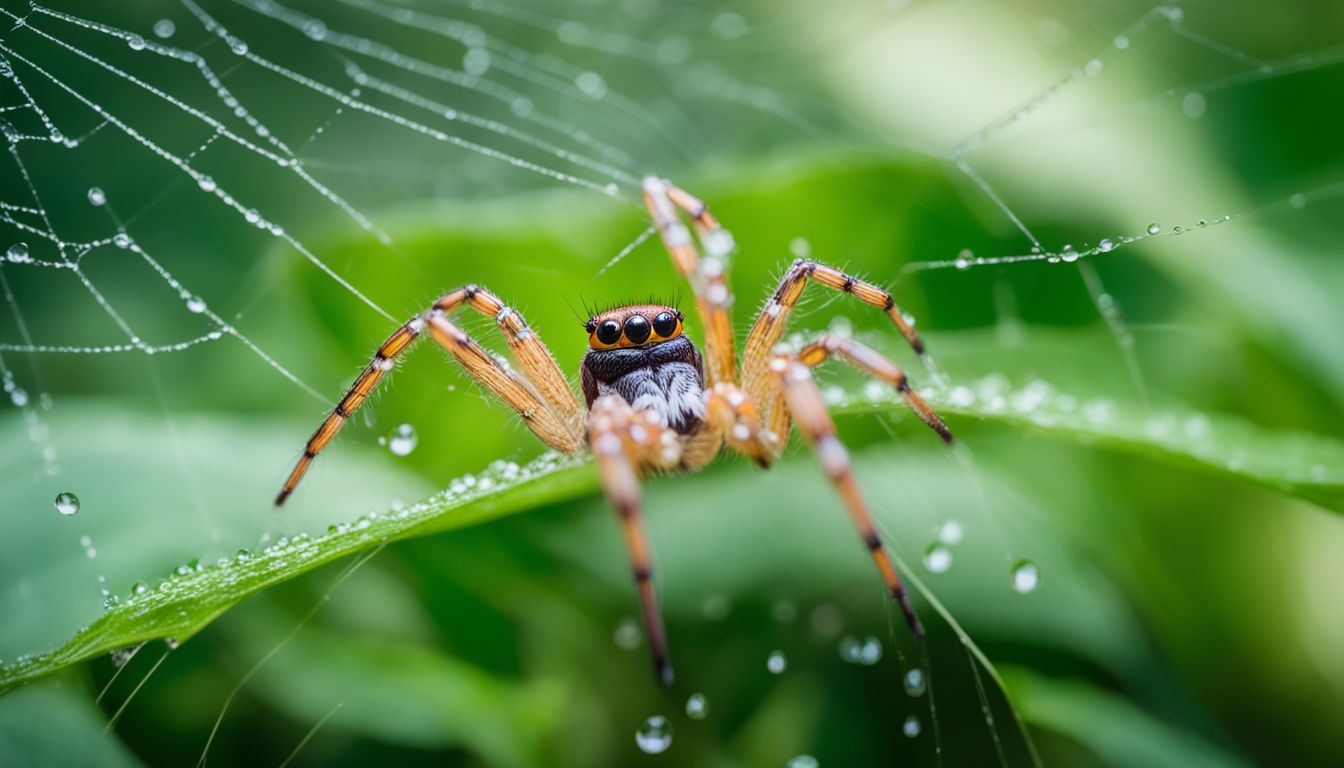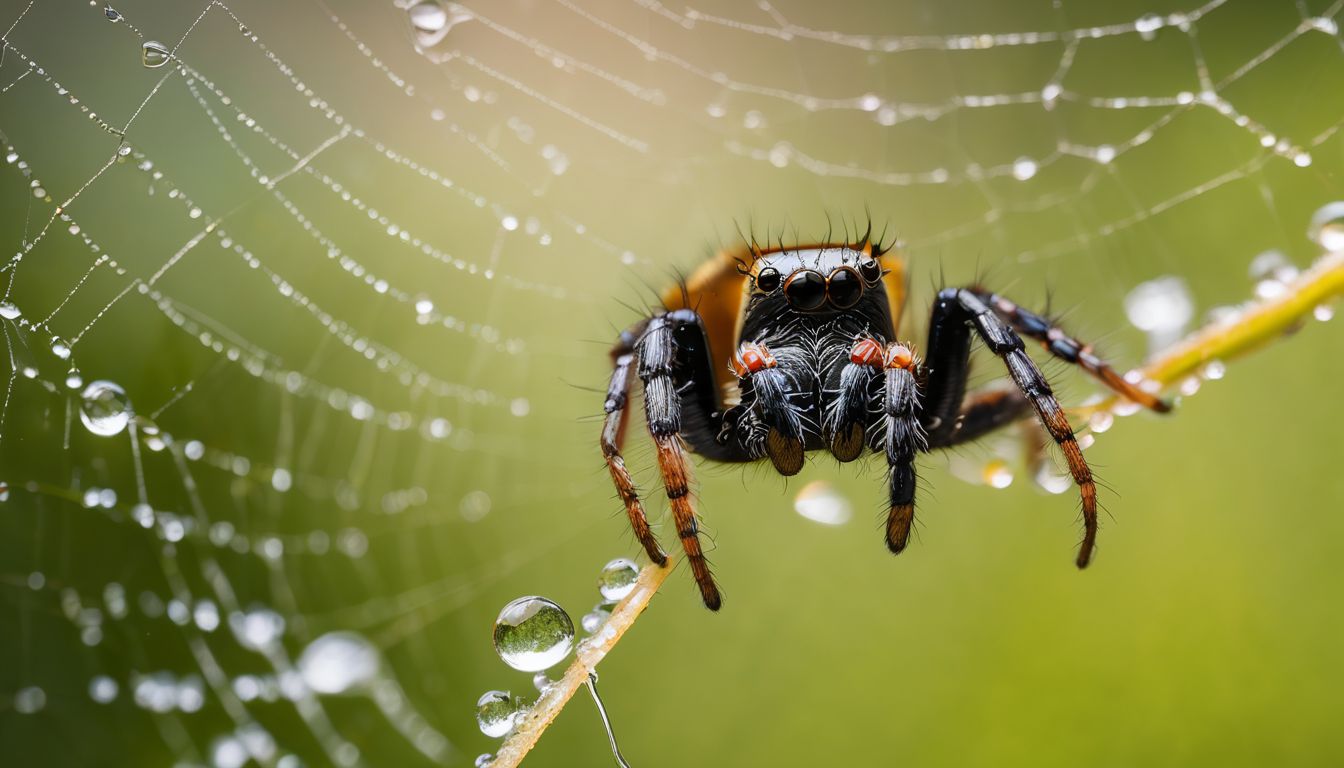Many of us have seen spiders lurking in corners, but have you ever wondered if these eight-legged critters need water to survive? Believe it or not, spiders do drink water. This blog will take a closer look at how our arachnid friends stay hydrated and why it’s vital for their health.
Dive in to wash away the myths and soak up some spider science!
Key Takeaways
- Spiders drink water through a process called hydraulic pressure, using their chelicerae to suck in moisture from various sources like dew, rainwater, food, and their webs.
- Hydration plays a crucial role in maintaining spider health; signs of dehydration include lethargy, sunken abdomen, loss of appetite, molting difficulties, and increased susceptibility to disease.
- Spiders do not drink water by crawling into humans’ mouths while they sleep; instead, they obtain water from natural sources and have fascinating adaptations for water consumption.
Debunking Myths: Spiders’ Drinking Habits Explored

Despite popular belief, spiders do not drink water by crawling into humans’ mouths while they sleep. This common misconception has been debunked through scientific research and observation of spider behavior.
The myth of spiders drinking from human mouths
Some people think spiders drink from human mouths, especially when they sleep. This idea is scary but not true. Spiders do not go near sleeping humans to get water. They also don’t like places as wet and warm as a person’s mouth.
Stories about spiders getting into mouths are just myths.
Spiders find other ways to drink. They use their mouthparts, called chelicerae, to sip on tiny drops of water they find in nature. In the next section, we’ll look at how spider hydration really works and where these creatures actually get their water from.
How Spiders Drink Water

Spiders drink water through a process called hydraulic pressure, where they suck in moisture through their mouths and spread it throughout their bodies. To learn more about the fascinating ways spiders stay hydrated, keep reading!
The anatomy of spider hydration
Spiders have special body parts to drink water. They use their chelicerae, which are like tiny jaws near the mouth, to soak up liquids. Even big tarantulas sip water this way. Their mouths are right behind their fangs, and they can slurp from drops or puddles.
Water is critical for these creatures. It helps them digest food and stay healthy. Some spiderlings need just a mist of water on their webs to drink from small droplets that stick to it.
They all have unique ways of getting the liquid they need.
Sources of water for spiders
Understanding how spiders stay hydrated leads us to explore where they find their water. Although they’re small, spiders have various ways to quench their thirst.
- Dew on plants: Early in the morning, water droplets form on leaves and grass. Spiders can drink these tiny drops.
- Rainwater: After it rains, spiders find small puddles or droplets on surfaces to sip from.
- Moisture from food: Eating insects provides spiders with water. This helps them stay hydrated.
- Water dishes: In captivity, like with grammostola rosea tarantulas, owners give them water bowls.
- Their webs: Webs can catch more than just food; they also trap dew and raindrops that spiders can drink.
- Directly from a source: Sometimes, if there’s a large enough water source like a pond or stream, spiders may drink directly from it.
The Importance of Water for Spiders
Hydration plays a crucial role in maintaining spider health and well-being, making it essential for their survival. Understanding the significance of water for spiders can help ensure their overall welfare.
If you’re curious about how spiders stay hydrated and why it’s important, keep reading to learn more!
Hydration’s role in spider health
Spiders need water to stay healthy, just like humans. Without enough water, spiders can become weak and dehydrated. It’s important for their bodies to have the right amount of moisture so they can move easily and catch their prey.
In some cases, they get the water they need from the food they eat, but having access to a direct source of water is also crucial for them.
Water availability plays a big role in how spiders thrive. If there’s not enough moisture around, it can be harder for them to find what they need to drink or keep themselves hydrated.
Signs of dehydration in spiders
Hydration plays a crucial role in spider health. Now, let’s look at signs that can indicate a spider is dehydrated:
- Lethargy: A dehydrated spider may appear sluggish and move less than usual.
- Sunken abdomen: If a spider’s abdomen looks shriveled or sunken, it could signal dehydration.
- Loss of appetite: Dehydration often leads to a decreased interest in food.
- Excessive molting difficulties: Dehydration can make the molting process challenging for spiders, leading to complications during shedding.
- Increased susceptibility to disease: Dehydrated spiders are more vulnerable to infections and illnesses.
Do Spiders Feel Pain? Understanding Spider Sensations and Responses
Spiders do not feel pain as humans do. They don’t experience emotions like us. Scientists are still unsure if spiders have the capacity to feel pain. Spiders mainly get their water from the food they eat and may drink water droplets from their webs or surfaces around them.
There’s no clear evidence that spiders suffer in a way we would recognize as pain.
The study of spider senses and responses is ongoing, and it’s uncertain whether they have feelings or how they perceive the world. This lack of understanding leaves many questions about how spiders interact with their environment, including whether they experience sensations like pain when injured or threatened.
Fascinating Facts About Spider Drinking Behavior
Spiders have fascinating adaptations for water consumption, such as using their mouthparts to suck up water droplets and utilizing specialized hairs on their bodies to absorb moisture from the air.
Different spider species also have unique methods of obtaining and storing water.
Adaptations for water consumption
Spiders have special body parts that help them drink water and stay hydrated. Here are interesting facts about how they do it:
- Spiders use their mouths to suck up water – just like drinking through a straw.
- They also have tiny hairs on their bodies that help in collecting moisture from the air or surfaces.
- Some spiders can store water in their bodies, kind of like camels storing water in their humps.
- Certain species have the ability to absorb water directly through their exoskeletons.
Differences between species
Spiders belong to a diverse group of creatures, and their drinking habits vary across species. Here are some key differences in how different spider species obtain and consume water:
- Some spiders, like the fishing spider, can skitter across the surface of water to hunt for prey or escape from danger.
- Water spiders, also known as diving bell spiders, create underwater air chambers where they store air to breathe and consume food.
- Certain web – building spiders collect dew or raindrops from their webs as a source of hydration.
- Arboreal spiders residing in trees may lick moisture from leaves or absorb water through specialized hairs on their bodies.
- Ground – dwelling spiders often rely on finding small puddles or moist soil for drinking.
Conclusion
In conclusion, understanding how spiders drink water gives us a peek into their fascinating behaviors. Debunking the myth of spiders drinking from human mouths reveals the truth about their hydration.
Learning about the sources of water for spiders sheds light on their unique adaptations. Appreciating the importance of water for spiders helps us appreciate these creatures’ survival strategies.
Exploring spider drinking behavior enriches our understanding of these remarkable creatures in the natural world.
FAQs
1. Do spiders need to drink water?
Yes, like many creatures, spiders do need water to live.
2. How do spiders find water?
Spiders can find tiny drops of water on leaves or the ground, and sometimes they might drink from small puddles.
3. Will a spider drink water every day?
Spiders don’t have to drink every day. They can get by for a while without drinking if they have to.
4. What happens if I put a dish of water near a wasp nest?
Putting water near a wasp nest is not safe because it could make the wasps come out and maybe sting you if they feel threatened. It’s best not to try giving them water this way.




